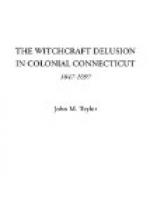“Further this depont saith, that comeing into the house where the witch was kept, she found onely the wardsman and goodwife Baldwine, there goodwife Baldwin whispered her in the eare and said to her that goodwife Knapp told her that a woman in ye towne was a witch and would be hanged wthin a twelue moneth, and would confess herselfe a witch and cleere her that she was none, and that she asked her how she knew she was a witch, and she told her she had reeived Indian gods of an Indian, wch are shining things, wch shine lighter then the day. Then this depont asked goodwife Knapp if she had said so, and she denyed it; goodwife Baldwin affirmed she did, but Knapps wife againe denyed it and said she knowes no woman in the towne that is a witch, nor any woman that hath received Indian gods, but she said there was an Indian at a womans house and offerred her a coople of shining things, but she woman neuer told her she tooke them, but was afraide and ran away, and she knowes not that the woman euer tooke them. Goodwife desired this depont to goe out and speake wth the wardsmen; Thomas Shervington, who was one of them, said hee remembred not that Knapps wife said a woman in the towne was a witch and would be hanged, but spake something of shining things, but Kester, Mr. Pells man, being by said, but I remember; and as they were goeing to the graue, goodwife Staplyes said, it was long before she could beleeve this poore woman was a witch, or that their were any witches, till the word of God convinced her, wch saith, thou shalt not suffer a witch to liue.
“Thomas Lyon of Fairfeild testifyeth vpon oath, taken before Mr. Fowler, the 27th May, 1654, that he being set by authority to watch wth Knapps wife, there came in Mris. Pell, Mrs. Ward, goodwife Lockwood, and Mris. Pells two daughters; the fell into some discourse, that goodwife Knapp should say to them in private wch goodwife Knapp would not owne, but did seeme to be much troubled at them and said, the truth is you would haue me to say that goodwife Staplyes is a witch; I haue sinnes enough allready, I will not add this to my condemnation, I know no such thing by her, I hope she is an honest woman; then goodwife Lockwood caled to mee and asked whether they had named goodwife Staplyes, so I spake to goodwife Knapp to haue a care what she said, that she did not make differrence amongst her neighbours when she was gon, and I told her that I hoped they were her frends and desired her soules good, and not to accuse any out of envy, or to that effect; Knapps wife said, goodman Lyon hold yor tongue, you know not so much as I doe, you know not what hath bine said to me in private; and after they was gon, of her owne accord, betweene she & I, goody Knapp said she knew nothing against goodwife Staplyes of being a witch.




